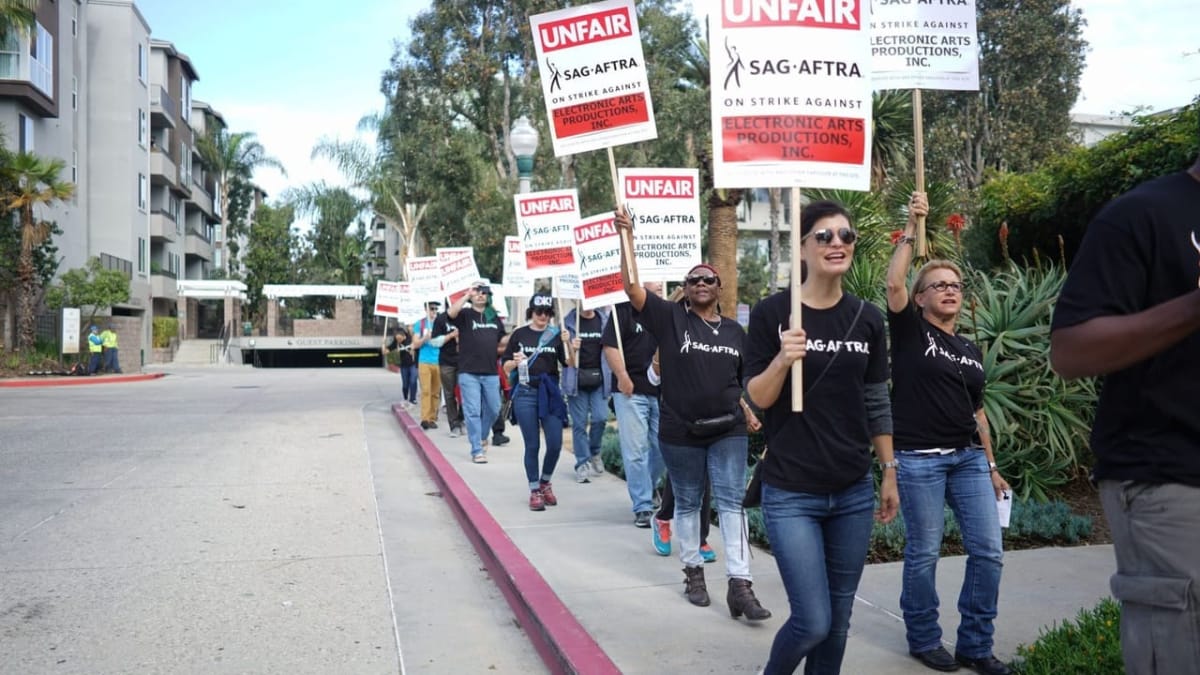Work conditions in the video game industry have been a hotly discussed topic since its inception, and things are certainly no different today. Modern games require far more hands to complete big projects than their retro predecessors, and creators vary wildly from development teams made of hundreds to one-man indie developers. Obviously, with this comes disagreements, and the biggest disagreement in the public sphere right now is the SAG-AFTRA (Screen Actors Guild - American Federation of TV and Radio Show Artists) strike.
Currently, voice actors who are members of SAG-AFTRA, the union representing actors and other performers, voted for potential strike action against video game publishing giants last year, and in recent weeks finally initiated it. The union had been negotiating with a legal team representing several well-known companies over safety concerns, contract guidelines, and most notably the amount and style of pay. The strike formally began in front of the EA offices recently, and starting November 3rd will move to the WB Games studios.
The disagreement stems from demands by SAG-AFTRA to update the Interactive Media Agreement, a universal contract the union held with the studios that serves as a baseline for performer contracts. SAG-AFTRA is the most powerful union representing performers of many types, including voice actors and motion capture performers. SAG-AFTRA's primary responsibility to their members is negotiating with entertainment companies to ensure contracts are fair to performers. The union describes its mission as being "committed to organizing all work done under our jurisdictions; negotiating the best wages, working conditions, and health and pension benefits; preserving and expanding members’ work opportunities; vigorously enforcing our contracts; and protecting members against unauthorized use of their work."
In addition, members are beholden to SAG-AFTRA and what the union calls the "Golden Rule One," which states that members will only seek work with companies who have a contract with SAG-AFTRA. That agreement, on one hand, ensures performers are only accepting work that is guaranteed to be fair to them, but also lends a great deal of power to SAG-AFTRA. To become a member, actors must work on a union project first (though according to this handy Reddit explanation, any actor can audition for a union project and be cast, or work in a background role, which would give them the ability to become a member).
https://twitter.com/nickmon1112/status/791974914529951749
The strike is not against the entire industry, but a collection of the biggest publishers represented by their legal team, Barnes and Thornburg LLP. The companies in question include well-known publishers like Activision, Electronic Arts, Insomniac Games, Take 2 Interactive, WB Games, and Formosa Interactive. The list also includes hiring agencies that specialize in video game performance work (and other contracted creative positions), including Blindlight, Disney Character Voices, Inc, Corps of Discovery Films, Interactive Associates, and VoiceWorks Productions.
[scribd id=329704247 key=key-vzA7oMAwdU2yTMZRCCxX mode=scroll]
Negotiations began in February 2015, according to SAG-AFTRA's timeline of events. During negotiations, SAG-AFTRA launched a public campaign with the hashtag #PerformanceMatters to draw attention to their demands and connect voice actors with players. The strike itself was authorized October 6th in 2015 by a vote of their members. Over 96% of those who voted approved the strike authorization. Negotiations continued up until the week before the first picket line was launched on October 21st. The video game companies claimed they had offered financial compensation equivalent to what SAG-AFTRA had demanded, but that the union simply refused to present it to members to be voted on.
Shortly after the first picket line at EA began, the PR company representing the video game companies launched a website called SAGAFTRAVideoGames.com. On the site, the video game companies claim that SAG-AFTRA has not been honest with their performers and that the companies' current offer is "time sensitive" and will expire in December. SAG-AFTRA shot back with a demand that the website not use their name and trademark, claiming the use is deceptive. In their own press release, they claim the video game companies "are spending more for a week of service from their PR hired gun than video game voice artists are asking for in secondary compensation on the most successful games in the world." Originally the site was titled "SAG AFTRA" and the URL could be easily confused as an officially sanctioned SAG-AFTRA site. The video game companies released a press release with the same information found on the website.
We want voice performers to know the facts about the wage increases, increased benefits and scheduling offers we are making to you through our negotiations with your union SAG-AFTRA. We have offered SAG-AFTRA a mutually beneficial package that rewards and respects the work and talent you provide to us and our fans. - Video Game Companies on SAGAFTRAVideoGames.comThe offer currently on the table from the video game companies is functionally similar to what SAG-AFTRA is demanding, though uses different formats and labels. The companies provided a table comparing their offer, SAG-AFTRA's demands, and the currently agreed upon obligations. On the main issue of compensation, SAG-AFTRA had originally demanded "Contingent Compensation," which would fall in line with their other agreements.
One of the most confusing aspects of the strike is the public's confusion regarding different forms of compensation. The "Contingent Compensation" is not a royalty program, but rather compensation which (as the name suggests) is contingent on events occurring. In this case, it would mean actors could negotiate an agreed upon bonus payment if their project sells above 2 million units. After that, actors could receive additional bonus payments for every 2 million units sold, up to 8 million.
SAG-AFTRA also refers to this as a "back-end payment" and claims the purpose of it is to ensure actors have a steady income between projects. Actors have stated that they often have weeks between projects where they have no income and it is uncertain when they might get another project. SAG-AFTRA also agreed to an option for "pre-payment" that would reflect roughly the same amount the potential contingent payments would, which is what the video game companies proposed.
However, the video game companies have refused the "Contingent Compensation," offering a 9% wage increase and "Additional Compensation" for performers who attend more than one session per project. SAG-AFTRA claims this is unfair to smaller studios who might benefit from their model if they cannot afford the higher upfront payments and further claim that video game companies are simply trying to avoid opening the discussion about residual payments. They also point to Take-Two Interactive's financial reports, claiming that they indicate video game companies already offer similar contingent bonuses to other workers on projects.
[scribd id=329700258 key=key-j7JEe7RlT9OP3WNXhLKf mode=scroll]
The current "Additional Compensation" offer would provide the same amount of money according to both parties; however, SAG-AFTRA has remained persistent in not only receiving payment in the residual form, but in calling it "Contingent Compensation" and not just additional. An official response from SAG-AFTRA further condemned the industry for its practices, which has been widely criticized in the past:
We often wonder the same thing. They appear to be concerned that if they are seen to compromise with one group of employees, other groups of their employees might get ideas. This is not an industry with the best track record of labor practices. They have a long documented history of overworking their employees to the point of damaging their physical and emotional health. Our performers are at the vanguard of demanding better treatment, but they are surely not the only video game employees in need of it. - SAG-AFTRAThe parties also disagreed on role transparency and how much information should be disclosed to actors who audition and negotiate contracts for roles. Actors have already spoken up about the small amounts of information they often receive when going into a role in the video game industry, with many never finding out what project they worked on. Some games do not provide explicit credits for voice over actors either. SAG-AFTRA demanded more information about projects, including the name of the project, and that voice actors be included in Non-Disclosure Agreements to avoid company secrets from being leaked to the public. The video game companies accepted part of the demands, stating they would provide information about the genre, use of stunts, use of sensitive content that actors may object to, and would be willing to provide code names and whether the role is a reprisal.
Originally, SAG-AFTRA had made demands about limited integration as well, or the use of a performer's work in other iterations of that work, such as sequels or marketing. This particular demand may have come in response to a situation involving Michael Hollick, the actor who helped portray Niko Bellik in Grand Theft Auto IV. Hollick had done all of the voice acting work for the project over the course of 15 months. When the game was preparing to release, parts of his performances were also used in commercials. Most SAG-AFTRA agreements require that actors must be compensated for any use of their work, including if it is used in sequels, remakes, or for marketing purposes (since obviously, actors are regularly paid for commercials as well). The current agreement on the matter is that video game companies may "buy out" an actor's work strictly for use within the same franchise.
https://twitter.com/Marisha_Ray/status/791716496091197440
Rumors have been spurred that games are already being postponed as a result of the strike. In particular, Injustice 2 has seen delays in release of information, which has led many to speculate that the game may be facing delays because of the voice actor strike. There has been no official comment on the matter and currently this is only a rumor. SAG-AFTRA has an official list of projects that will be affected by the strike, including Kingdom Hearts 2.8 and the Crash Bandicoot Remaster. Titles affected are only those that began development after February 17, 2015. It is worth noting that on some of these titles listed, the voice acting was already completed and it didn't change the release of the game such as Insomniac's Song of the Deep.
The picket line continues next week at WB Games in Burbank, where they are currently working on Injustice 2. SAG-AFTRA has scheduled the live strike on November 3rd. Negotiations have likely continued behind the scenes even as public discussions have deteriorated into PR games. The potential solutions aside from an agreement between the two is that video game companies decline to be part of SAG-AFTRA. This does not seem to be on the table, though, as it would mean no longer being able to hire any actors who are members of the union, and in the case of some companies, may harm non-game projects. The protest has also drawn ire and misunderstanding about the nature of voice acting. As with all professions, there are many assumptions about what voice actors do, so many have treated it as an opportunity to talk openly about their work. Many though have expressed concerns that this could make it harder for new voice actors to break into the industry, if the video game companies agree to the new contract.
Keep checking back here at TechRaptor for the latest news on the SAG-AFTRA strike.







